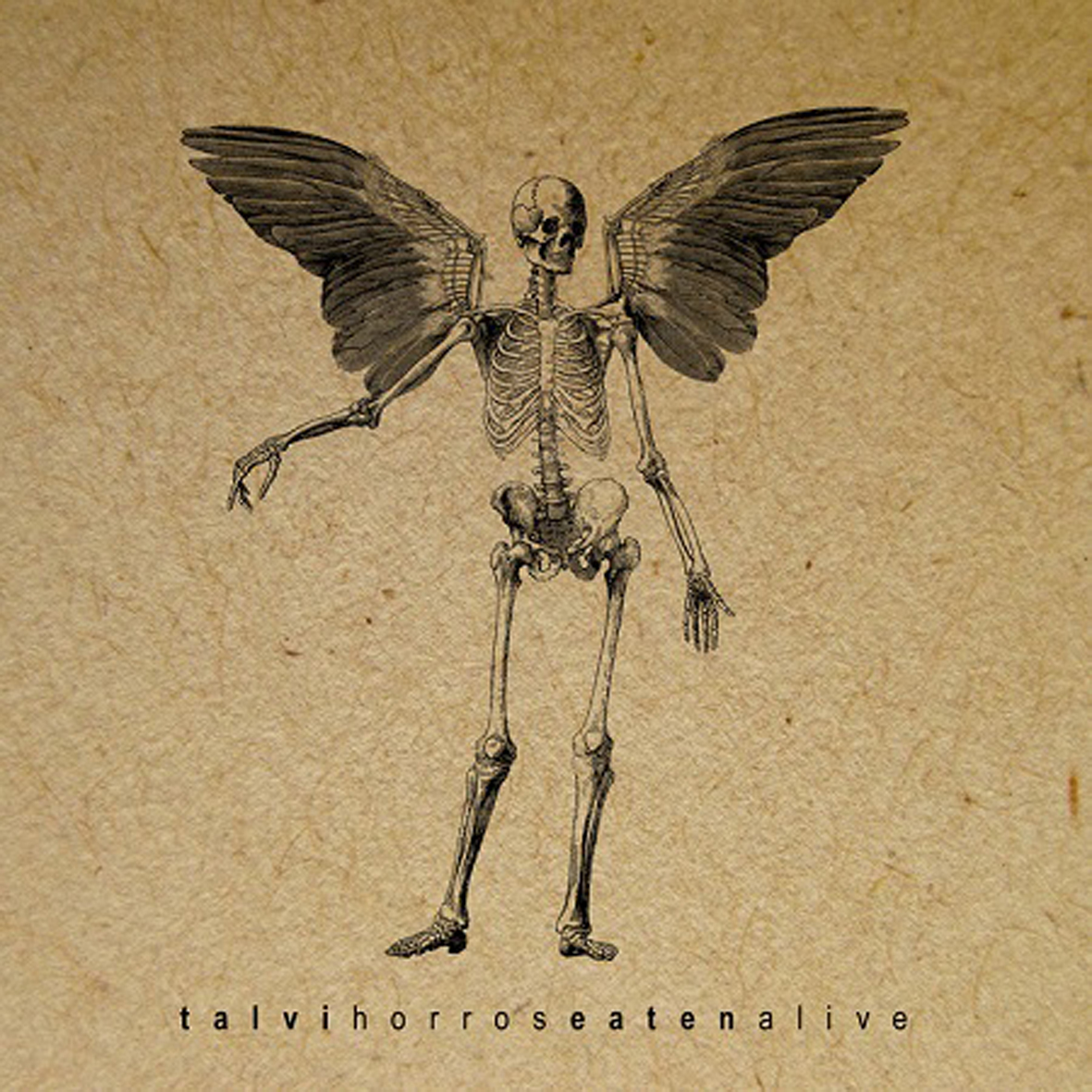Talvihorros, "Eaten Alive"
 Ben Chatwin is not one to shy away from ambitious concepts, having previously devoted albums to both the subconscious and the creation of the world.  Now, in collaboration with Fluid Radio's Dan Crossley, he tackles the more intimate subject of their shared alienation and misery in London.  Curiously, however, the music and packaging of Eaten Alive are much more elaborate than anything Chatwin has ever done before.  I had some difficulty reconciling myself with that, as something is definitely lost in Chatwin's transition from experimental guitarist to full-blown composer/urban historian/multimedia artist, but he certainly made a valiant and impassioned effort to do something truly unique and special this time around.
Ben Chatwin is not one to shy away from ambitious concepts, having previously devoted albums to both the subconscious and the creation of the world.  Now, in collaboration with Fluid Radio's Dan Crossley, he tackles the more intimate subject of their shared alienation and misery in London.  Curiously, however, the music and packaging of Eaten Alive are much more elaborate than anything Chatwin has ever done before.  I had some difficulty reconciling myself with that, as something is definitely lost in Chatwin's transition from experimental guitarist to full-blown composer/urban historian/multimedia artist, but he certainly made a valiant and impassioned effort to do something truly unique and special this time around.
Chatwin's music has always tended towards the cinematic, addressing compelling themes evocatively and with a thoughtful narrative and dynamic arc.  Eaten Alive certainly continues that tradition, but does so in a different way, resembling a soundtrack to a non-existent film rather a complete, fully-formed world of its own.  In a way, however, "the non-existent film" that Ben is soundtracking is actually the very real life of Crossley–specifically Dan's tales of addiction, crime, and homelessness in '80s London.  Crossley's contribution extended beyond just providing inspiration though, as the now sold-out limited edition further (and more concretely) illuminates his past with a booklet of his haunting, grainy photography from the period.  As a complete piece of art, that edition succeeds beautifully in many ways, but that success becomes quite a bit blurrier when the music is decontextualized and presented alone.
Another problem is that while Chatwin had no trouble brilliantly tackling the more abstract ideas of subconsciousness and dreaming with 2011's Descent into Delta, the seemingly more modest and tangible challenge of evoking a period from someone's life is one that does not suit his aesthetic nearly as well.  For an album that openly sets out to reflect the worst of human nature, Eaten Alive often feels like a very polished, muted, detached, and monochromatically melancholy affair.  Occasionally, Ben hits upon something inspired and apropos, like the roiling, buzzing, and snarling intro to "Little Pieces of Discarded Life," which sounds wonderfully like a broken televison in a ruined flat reluctantly coming into focus.  Many other times, however, Chatwin's music sounds positively baroque (such as in the crescendo of "The Secrets of the Sky").  There is nothing objectively wrong with that (it sounds like Talvihorros collaborating with John Carpenter on the credit music for a zombie film), but it feels like a bizarre choice given Eaten Alive's aim (but totally appropriate for its title, obviously).
Yet another problem is probably me and my preconceived idea of what I want a new Talvihorros album to sound like, as there are objectively a lot of very cool passages strewn thorough these 8 pieces, such as the heavy, buzzing outro of "Becoming Mechanical."  Also, there are a number of strong melodies and the whole thing forms a meticulously executed and coherent arc.  If I could just experience this album in a completely different context and forget that it was a Talvihorros album, I could probably enjoy it a lot more than I do, but I cannot.  I desperately want this album to be intimate and occasionally raw and violent (like life), but the complexly layered arrangments, deliberate pace, and homogenizing synth parts make me feel like I am listening to Mogwai covering a classic In The Nursery album or something.  I would have no (serious) problem with such a union occurring, but hearing Chatwin sound like that makes me wince a little.
Of course, all of my griping is rooted in the fact that I historically love Talvihorros, which has the unfortunate effect of saddling me with all kinds of critical baggage and expectation.  While I definitely prefer Ben's last two releases to this one, I am (grumblingly) still quite pleased that Eaten Alive exists: Chatwin and Crossley certainly cannot be faulted for lack of vision or effort and they break some interesting new ground in the realm of...what?  Experimental documentary (so experimental that there is not even a film)?  Abstract sonic biography?  I have no idea.  In any case, this was an excellent idea for a project that probably thoroughly delighted the 200 people who got the complete experience.  As pure music alone, it does not necessarily work for me, but I hope Ben is not dissuaded from taking similarly bold chances in the future.
 
 



